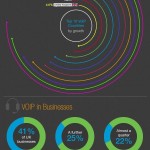How the Blockchain Will Change Social Media
It seems like every time you turn around, you are hearing about the blockchain and how it will disrupt nearly every industry. What started as a basis for the decentralized cryptocurrency Bitcoin is now being applied to many different industries, including supply chains, education, healthcare, and even the legal profession through the use of smart contracts.
One area that is not often talked about is social media. While we have probably heard way too much about the information these networks collect and who it is being shared with over the last several months, it seems there are few solutions in the works, at least for current networks. However, there are some forward-thinking companies that believe that the answer lies in the proper use of the blockchain.
Make no mistake — social media is big business, and all that data is worth a lot to advertisers and marketers. But social media is really just traditional marketing modernized. That modernization involves a great deal of personal data.
The blockchain could disrupt all that, changing how marketers reach their audience and how customers find what they are looking for. Here are some ways that blockchain will change social media sooner rather than later.

Source: https://www.maxpixel.net/Data-Records-Block-Chain-System-Concept-3145389
Verified Identities
Verified identities is important in a world where last year as many as 48 million accounts on Twitter were believed to not be real people according to CNBC. The biggest issue with this is that most people and even social media management programs can’t tell who is who. That means if you are a business and you run an ad on Twitter or Facebook, you can’t be sure that a large percentage of the engagement you get isn’t fake.
This is problematic for the average user too. Do you accept that friend request or follow back that Twitter account, affording it even more legitimacy? It’s a hard question to answer, and one that has been explored before. Even boosting your posts or page on Facebook or other social networks through “legitimate” means can result in page and post likes that are not real.
In fact, in some cases paying for more likes causes engagement to go down. Although Facebook is supposedly constantly trying to fix the problem, it isn’t going away. Click farms create more accounts every day than Facebook could possibly keep up with deleting. What if an identity could be positively verified before a user is allowed to join a social media network?
With the blockchain, this is quite possible, and in fact the 0xcert protocol provides a framework so that developers can develop decentralized apps, called dapps, that are blockchain based and can be used to verify online and in-person identity and the source of information (more on that in a moment).
Verified identities actually protect marketers from excessive fake PPC clicks and protect users from fake accounts and hacks of their own account. The blockchain will play a huge role in this going forward.
Less Fake Content
The same way that identities can be verified, so can sources of information. For instance, if a story claims to be from a popular news site, with the blockchain, because each block is unalterable and transparent, the source of a story can be easily determined. News articles could be shown that are from verified sources only.
If a new news site pops up, the source and the owner of the site can be verified as well, as that information must be shared for the news to show up with a verified status. Therefore when “fake news” does show up, it can be traced to its source and that source can then be removed from news feeds.
Even when it comes to journalism, making sources a part of the blockchain when they can be revealed without jeopardizing them adds to the credibility of the news outlet. It’s much harder to label a story as fake or spun when the source is openly shared and verified via the blockchain.
It’s not a perfect solution. Since the blockchain is transparent and unalterable, someone imbedded with the source of the blocks could still share false information. A blockchain based system for social media would make that task much more difficult.
Controlling Your Own Personal Information
It has often been said that you don’t have to worry about the NSA; the people who really have all of your information and control it are Amazon, Google, and Facebook. Recent headlines tell us this is fairly accurate. Today is a new world of privacy, especially when it comes to social media, and for the most part you control who sees what you put there.
Thanks to GDPR passing in the EU, individuals have potentially more control over their data, provided they read the terms and conditions carefully and refuse any that they feel compromise their privacy. There is another solution though, and again it involves the blockchain.
Using advanced and developing apps like Skycoin, users can control who sees their data and they can control exactly where it goes. This means that instead of marketers paying a social media network to gain access to your information, they would pay you, the owner of the information, and you would be able to choose who has access.
This means the monetization of personal information is done by the owner of the information rather than a third party.
What does all this mean for social media? As recent events tell us, people are becoming more concerned with privacy and who gets access to their information. “Fake news” is all over the news, and bots are “liking” and “sharing” that news which is costing all of us big money. The blockchain will change all of that, altering the way social media is monetized and which networks will actually survive the coming changes.

















